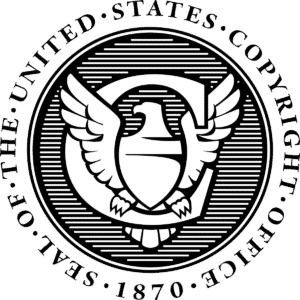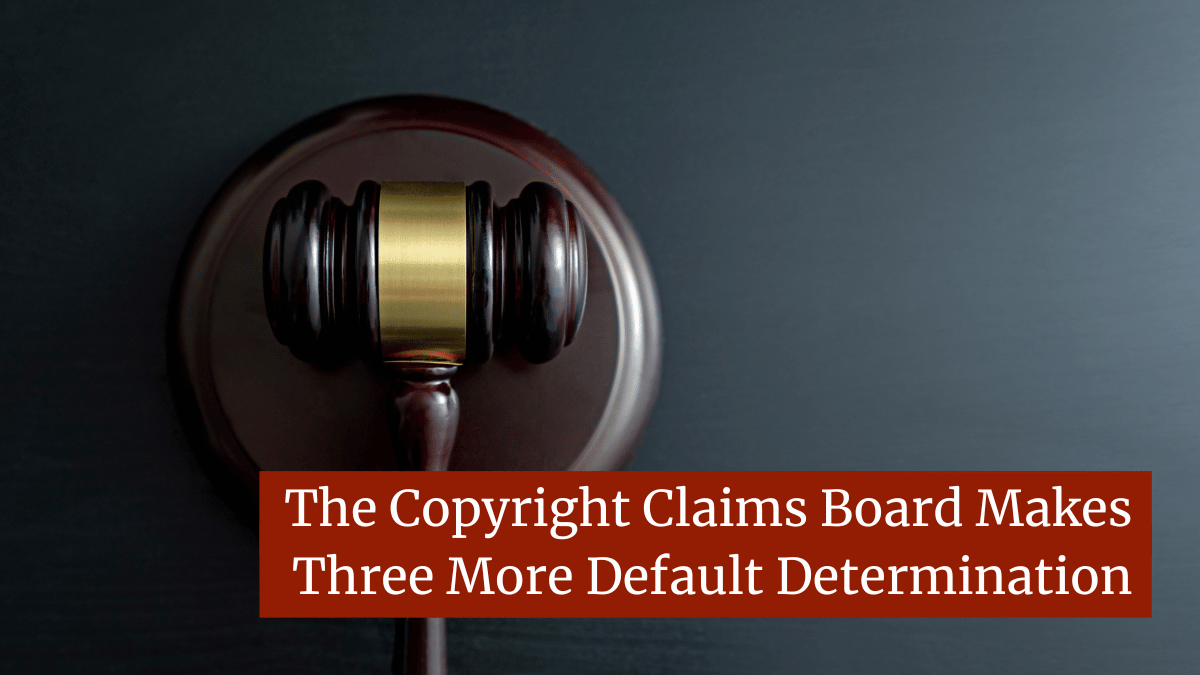Copyright Claims Board Issues Three More Default Determinations

Since the Copyright Claims Board (CCB) opened its doors in June 2022, it has only issued eight final determinations in cases before (as of today). Three of those final determinations are the CCB dismissing claims at the request of the parties involved, leaving five that are actual judgements.
The first came in February 2023 when the CCB decided a case involving photographer David Oppenheimer, who was awarded $1,000 in statutory damages for the use of his image on a lawyer’s website. A second came just last month as the CCB awarded photographer Dana Hursey $3,000 in a default judgement over a similar use.
However, since then, the CCB has handed down three more final determinations, all default judgements and two of them also dealing with Hursey and the third dealing with Joe Hand Promotions (JHP), one of the CCB’s most prolific filers.
Though all three determinations are default judgements, they also highlight the direction that the CCB will likely be moving forward in the future. Because, while one case is not precedent for later cases at the CCB, the board has been remarkably consistent when handing down these decisions.
As such, it’s worth taking a look at these judgements to see how the CCB is handling these cases.
The Dana Hursey Determinations
First off, the CCB handed down two more default judgements in cases filed by photographer Dana Hursey.
Last month, we took a look at the first default judgement in a case filed by Hursey. There, he was awarded $3,000 in statutory damages for the use of one of his photographs on a small company’s website.
The ruling was interesting because it was the first default judgement issued by the CCB and the case was a “smaller claims” case, meaning that it was heard by only one person, not a panel of three, and damages were capped at $5,000.
Hursey has filed at least eight cases with the CCB, however, five of those cases were withdrawn. Two were withdrawn due to opt-outs by the respondent, one was withdrawn voluntarily (likely due to a settlement), and two others were withdrawn due to lack of service.
However, the three that did continue turned out to be default cases where the respondent never participated in the process, not even to opt out. We discussed the first default judgement last month, and these last two are virtually identically.
Both cases involved Hursey filing a claim against the use of his images on commercial websites. The first on the website for a doctor, Robert Quinney, and the second for a company named Hakimian Global LLC.
The facts of both cases are similar to the first one, something the CCB recognized. As such, the board handed down identical $3,000 determinations in both cases.
This shows that, while cases at the CCB aren’t precedent for one another, the board is working to keep consistency between rulings and that is a theme that spills over to the next default determination.
The Joe Hand Promotion Determination
We discussed Joe Hand Promotions in detail back in April. However, it suffices to say they are the company that licenses UFC, WWE, AEW, Boxing and other pay-per-view events to bars, restaurants, clubhouses, lounges and other public spaces.
The company has become one of, if not the most prolific filer with the CCB, having filed dozens of cases with the board.
However, this is the first case to reach any kind of judgement. The case targets Arif Skyline Café LLC, a restaurant in Virginia that, according to an investigator, in October 2019, streamed UFC 241 to their customers without a license.
According to the investigator, the audience was around 11 people and the venue could accommodate less than 50 people at maximum capacity.
JHP estimated that a license to show the work legitimately would have cost $866. As such, they asked for four times that amount, $3,464, in damages.
The board agreed that was reasonable but opted to lower it to approximately three and a half times the actual damages, giving an award of $3,000.
The CCB also opted to dismiss, without prejudice, a claim against an alleged organizer of the event named Hellen Kassa. According to the determination, there was not enough evidence that she was connected to the infringement.
What stands out in this case is that the damages awarded were the same as the three cases filed by Hursey, even though the facts of the cases are very different. As such, it’s worth examining how the CCB got to this damage award and what it may mean for future cases.
Examining the Outcomes
Though the outcome was fundamentally the same, there were several differences between the Joe Hand Promotions ruling and the three Hursey ones.
- Not Smaller Claims: Joe Hand Promotions opted not to go through the “smaller claims” process, which Hursey did. This means that damages in the JHP’s case could have been as high as $15,000. However, they only requested $3,464, making the choice to not use that option an interesting one.
- Different Facts: JHP filed its claim over an unlicensed public showing of a UFC event, Hursey’s cases dealt with sites using his images without a license. Though all cases targeted small businesses, the work being infringed and the nature of the infringement is different.
- Different Requests: In both cases, the board asked the claimant what damages they felt were reasonable. JHP asked for 4x the licensing costs, $3,464, and Hursey asked for the maximum of $5,000. Both ended up with $3,000
To be clear, it makes perfect sense that all of Hursey’s cases would see the same damages, as all the facts were virtually identical. Likewise, it’s almost certainly just a coincidence that the JHP case also came up to the same amount. So putting too much focus there probably isn’t worthwhile beyond it being mildly amusing.
However, there are lessons that we can take away from these cases:
- How the CCB is Calculating Damages: It’s pretty clear that the CCB is being very thorough in how it calculates damages in default cases. In all the cases above, the CCB looked less at what the claimant proposed and more at the facts of the case. Statutory damages are going to be a multiplier of proven actual damages in these cases, making it important to prove actual damages, even in default cases.
- CCB Critical Analysis: One fear that many had with the CCB is that it would be a place for “copyright trolls” to quickly get significant damage awards without much oversight. But that isn’t how it’s gone. The board has closely analyzed the facts and evidence, even in default cases, and, as we saw with Kassa, is dismissing claims that don’t have enough evidence. So, don’t assume that the CCB will hand out easy big wins in default cases.
- They Like Round Numbers: So far, every decision they’ve handed down has been in multiples of $1,000. This is especially odd in the JHP case as they had requested $3,464 using a 4x multiplier on the cost of a legitimate license. Instead, the board knocked it down to $3,000 saying it was approximately 3.5x the license fee. However, 3.5x would be $3,031. It seems that the CCB just wanted to round it down to the next multiple of $1,000, a trend that is likely to continue.
All in all, while we’re still very early in seeing how the CCB is going to rule on its cases, we’re already getting some pretty clear indications on how the CCB is examining cases and what kinds of damages are likely to be awarded.
Bottom Line
In the end, I think all of these decisions were fair, and I don’t have any major problems or issues with how the CCB handled any of these cases.
They’ve made it clear that, if you are served with paperwork from the CCB, you need to respond, even if it is just to opt out. The one contested case that the CCB has decided saw damages of ⅓ of the damages of default determinations with relatively similar facts.
Though Hursey had better evidence and there were other factors, there’s no doubt that the default nature of the case was one of the reasons the damages were as high as they were.
Still, the main point that I think the CCB is making is that they are a serious institution for addressing copyright issues. They are going through much of the same process you would expect in a federal court, just in a smaller, cheaper and more accessible package.
We should be seeing more final declarations over the next few months as many more cases seem to be coming to a head. So this will be a space to watch over the next few months.
With those cases, we should have an even more clear picture of what the CCB will look like and what the board will be seeking when it comes to hearing copyright cases.
Want to Reuse or Republish this Content?
If you want to feature this article in your site, classroom or elsewhere, just let us know! We usually grant permission within 24 hours.
